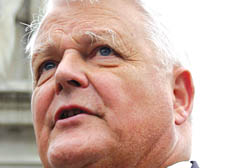|
|
 |
| |

Bruce Kent |
In our ‘post-modern’ age, it’s time to write war out of the plot
After a long history of militarism, closer ties mean war within the European community is almost unthinkable, writes Bruce Kent
order this book
THIS is a most interesting and stimulating book, even though I had to say “Yes but” – and worse – at various stages and pages.
The strapline is, to start with, rather misleading. Do we in Europe really hate going to war? We all sat back and applauded as the task force went on its way to the South Atlantic as if there was no other way of settling the Falklands conflict.
That was the last time I was spat on in public as I walked down Whitehall urging a peaceful resolution. The Afghan and Kosovo bombings and the first Gulf war all had general public approval.
The opposition to the second Iraq war was very different. Had it been shown, however, that Saddam Hussein did have nuclear weapons, or was on the edge of getting them and could actually threaten us within 45 minutes, public reactions might have been very different.
What is clear is that we don’t want to fight wars on the basis of lies.
It is absolutely true that, thanks to the visionaries who put the coal and steel community together long ago, we now have a Europe so interlocked that war between any of its component parts would be as absurd as war between Hampstead and Highgate. The residents of what is now the United States actually showed us the way. They could well have been the Disunited States and as accustomed to interstate warfare as Europe has been over centuries. Wiser counsels prevailed.
In this sense Richard Cobden, who gets honourable mention in this book and whose statue stands outside Mornington Crescent station today, was quite right.
He just did not go far enough. Economic ties are not enough to bring war between states to an end. Political, juridical and cultural ties are needed as well.
The European community has its problems. But federalism whatever its shape does not have to mean top-down dictatorship and can go a long way to consigning war to history.
Whatever the caveats about the strapline, James Sheehan gives us in these pages a wonderful and fascinating canter through the militarism of the 19th and 20th centuries.
I did not know how Kitchener managed to mow down the supporters of the Mahdi from the security of his riverboat, so well provided as it was with Maxim guns.
Nor was I aware that Churchill in 1920 was as open as possible about his racism, saying: “I do not understand this squeamishness about the use of gas… I am strongly in favour of using poison gas against uncivilised tribes.”
HG Wells is a familiar name, but not many will today know about his fictional battle of Dorking. Or that Bertrand Russell in 1937 told a London crowd that if the Nazis decided to invade they should be welcomed like tourists.
“They would find some interest in our way of living and the starch would be taken out of them,” he said. So much for the concentration camps!
Many will not know that the French had some 400,000 troops in Algeria trying to put down the “insurgents” to preserve the last jewel of French colonialism.
The account of the 180-degree turn achieved by De Gaulle on this issue is a lesson for all politicians who appear to be facing a brick wall.
On Ireland, there is room for dispute. I doubt if it was just an aggressive minority of the Irish population that had “come to view England as an occupying power”.
Sheehan gives us a fair account of the developing Cold War, of the division of Germany and of the formation of Nato, even though he repeats without comment the traditional Nato view that the Soviet Union had overwhelming superiority in conventional forces.
The book concludes with a thought-provoking chapter on the future of the civilian state. We are moving into what Edward Luttwak has called the “post-heroic” age. No bad thing, it seems to me, if that means less military heroics and more common sense about what global security really involves.
It was Professor Sir Joseph Rotblat, whose name does not appear in these pages, who said after getting his Nobel prize, that “War must cease to be an admissible human institution. The abolition of war must he our ultimate goal”. This book, is a positive step in that direction.
• |
 |
|
 |
 |
|
 |
|



